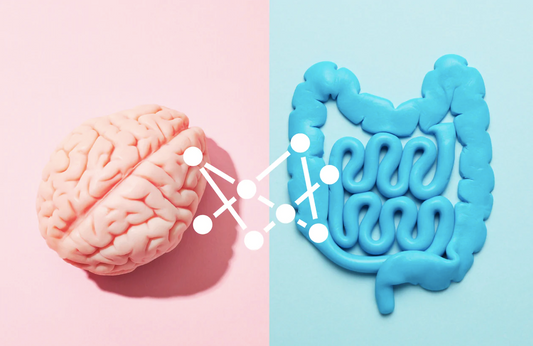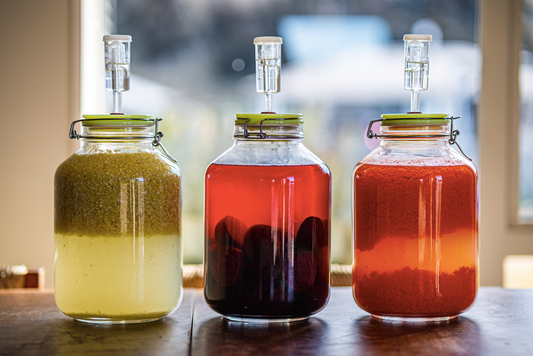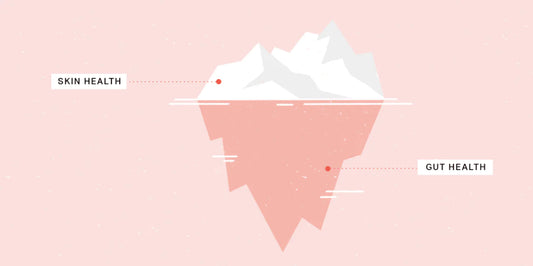When preparing for pregnancy, most people focus on fertility, prenatal vitamins, and diet, but one critical factor that often gets overlooked is gut health. Your gut microbiome—the trillions of bacteria, fungi, and other microorganisms living in your digestive tract—plays a significant role in fertility, pregnancy health, and even the well-being of your baby. Supporting your gut before and during pregnancy can lead to better nutrient absorption, hormone balance, immune function, and overall maternal and infant health.
Let’s look at a timeline of how gut health can affect a woman from menstruation through to preconception care and finally pregnancy and the baby’s health.
Menstruation
The gut microbiome plays a key role in estrogen metabolism, which directly impacts menstrual cycle regularity and symptoms. Beneficial gut bacteria help process and eliminate excess estrogen, reducing the risk of hormonal imbalances that contribute to heavy periods, painful cramps, and PMS symptoms. Dysbiosis (an imbalance in gut bacteria) has been linked to menstrual irregularities, pain, and heavy bleeding (Baker et al., 2017). This is both dysbiosis in the gut and in the vaginal microbiome which can affect the presentation of a period. These two microbiomes (gut and vaginal) are tightly related and addressing the gut will typically have a flow on effect.
Preconception Care
A well-balanced gut microbiome is essential for regulating hormones, reducing inflammation, and improving nutrient absorption—all of which are critical for conception. Gut dysbiosis has been linked to conditions like polycystic ovary syndrome (PCOS), endometriosis, and unexplained infertility (Torres et al., 2018). This is partly to do with the relationship the gut has with the vaginal microbiome and the presence or absence of inflammation within the uterus. If there are unfriendly microbes it makes it a lot harder for sperm to move through or for a fertilised egg to implant in the uterine lining.
Pregnancy
Once pregnant, a healthy gut microbiome continues to play a vital role in nutrient absorption, immune function, reducing the risk of pregnancy complications and setting up your baby’s microbiome. Gut bacteria help break down food, absorb essential vitamins and minerals, and regulate inflammation.
Benefits of a Healthy Gut During Pregnancy:
-
Better Digestion and Reduced Nausea: It is known that the gut microbiome goes through a big shift during pregnancy. A balanced gut can help minimize common pregnancy issues like bloating, constipation, and morning sickness (Dreher et al., 2019).
-
Stronger Immune System: It’s important to prevent sickness during pregnancy and we know that your immune system is largely housed within your gut. A diverse and rich microbiome is essential for this.(Kumar et al., 2020).
-
Lower Risk of Gestational Diabetes: Gut health has a big part to play in your metabolic health which influences your glucose metabolism and therefore risk of developing gestational diabetes. Certainly families of bacteria (firmicutes) are known to be sugar feeding bugs and more so associated with an overweight/obese state. Eating processed carbs and sugars will encourage the growth of these microbes. (Ferrocino et al., 2018).
-
Healthy Fetal Development:The mother’s gut bacteria influence the baby’s microbiome, which affects digestion, immunity, and long-term health outcomes. It is also now known that the placenta has its own microbiome which will influence the baby’s developing microbiome. We used to think that babies were born sterile and that their first exposure to bacteria was through the vaginal canal. However, we now know that their microbiome is already developing in the womb and will be further enhanced during birth, skin-to-skin contact and how they are fed.
-
Reduced Risk of Miscarriage and Preterm Labour: Studies indicate that an imbalanced microbiome, particularly an overgrowth of harmful bacteria, can contribute to systemic inflammation and immune dysregulation, increasing the risk of miscarriage and preterm birth. Infections such as bacterial vaginosis, which is linked to gut health, have been associated with premature labor and pregnancy complications (Kindinger et al., 2017, Dunlop et al., 2015).
How to support gut health through these phases:
In general the same recommendations go for each phase in order to support your gut and optimise its function. However, if there were a specific issue, e.g. dysbiosis was discovered, you may require a more personalised approach depending on what it is. Otherwise, the following tools will set you up well for all of these phases.
-
Increase fibre intake to support estrogen clearance → anything made from a plant will be rich in fibre! E.g. greens, vegetables, fruit, nuts, seeds, legumes. Aim for half a plate per meal.

-
Consume probiotic-rich foods to maintain microbial balance → yoghurt, Clover Ferments, sauerkraut, kimchi, kefir. Aim for 2 serves per day. Without being too biased the Clover Ferment tonics would be by far the most potent of these suggestions! So, if you want good bang for your buck and to ensure you’re getting a decent serving of probiotics, stick to those. Home made versions of sauerkraut/kimchi/yoghurt are great but you can never be sure what bacteria (and the amount) are actually in these!
-
Reduce inflammatory foods, such as processed sugars, refined carbohydrates and packaged foods, which support the wrong bacteria in the gut and encourage a poor microbiome. Not to mention the fact that these provide little nutritional benefit and will contribute to unstable blood sugar levels and therefore poor energy and more risk of gestational diabetes.
-
Remain hydrated. This is key to keep everything moving through your digestive system and to help regulate bowel motions. I like to think of your digestive tract as a river - when it’s flowing well it’s a great environment (clear water, healthy animal and plant growth) and when it’s stagnant it creates a breeding ground for the wrong kind of bacteria to grow - dysbiosis. Aim for 2-3L of water per day.
-
Support good oral health - every time you swallow you are re-inoculating your gut with bacteria. We want to make sure it’s healthy in your mouth as well!
-
Brush your teeth at least twice daily
-
Floss daily
-
Investigate and address oral thrush or bad mouth odour
-
Use Clover Ferments to swirl and hold in your mouth

-
Manage stress, as chronic stress can negatively impact gut flora and hormone levels. I suggest sticking to 1 thing daily that you know helps to unwind and relax you. Here are a few suggestions:
-
Daily walk
-
Daily meditation
-
Daily time out reading a book
-
Daily sauna
Wherever you are on your health journey this is a worthwhile area to prioritise for both you and your future baby. Even if you have no health concerns I would still encourage you to think about implementing some of these points for prevention purposes and to optimise your health.
Grace Mortimer

Grace Mortimer - Head Clinical Nutritionist
Pheno Nutrition
https://www.phenonutrition.com/
-
BSc Neuroscience
-
dipGrad Human Nutrition
-
HPN2 Clinical Nutrition




